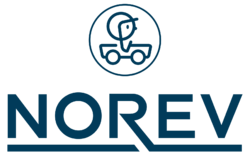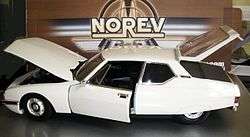Norev

Norev is a French manufacturer of diecast metal model cars. It has normally produced modern and vintage European vehicles, especially those of French origin - though Italian, German, British, and American vehicles were also produced. Norev's closest competition was Solido, but that company had more pan-European influence, while Norev was more national in orientation.
History

According to the official website, Norev was founded by the Veron brothers, in the suburb of Villeurbanne, near Lyon, France, in 1946 (Rixon 2005, p. 54). Norev is that family name spelled backwards. The company's first product was a small service garage with several plastic cars. Other products at the company's start were plastic toys for infants.
In 1953, the first vehicles manufactured were plastic and in 1:43 scale. They had colorful bodies and were notable for their red plastic hubs with white tires. Detail and proportion were very good and though the models lacked windows, they were very successful. Force's book (1991, pp. 164–235) shows that throughout the whole run of all Norev vehicles, without regard to scale or type, models were sequentially numbered from the first car as no. 1 in plastic (a Simca Aronde - 1953-1956) through no. 899 in zamac (a VW Golf Rally - 1984-1988) and beyond.
Through the 1950s the red hubs were replaced with silver and tires gradually became black (though some white tires were used until the late 1950s) and windows were added. In 1957, a 1:87 scale '500' series appeared, mostly these were the same models appearing in the 1:43 scale line.
In 1961, Emile Veron of the Veron family started Majorette, a separate company, also in the Lyon area. This new smaller line of cars would be competition for Matchbox and Siku Toys.
Going Diecast
The first diecast metal Norev models appeared about 1965 (Gardiner and O'Neill 1996, 64-65,86). Later, the famous 'Jet-Car' series, appeared in 1971. These were hierarchically labeled the '600', '700', and '800' series, sequentially as discussed above, according to cost. The '600' line was cheaply made and production soon stopped. The HO scale line was discontinued, but in the late 1970s, Force says that 1:66 scale Schucos appeared as a Norev line (the Mini-Jet series). The Mini-Jets were lauded for good castings while criticized for cheap plastic interiors and poor packaging (Rixon 2005, p. 55). Also, a Maxi-Jet line consisted mainly of trucks.
Norev's main competition in the 1960s and 1970s was Solido, though Norev's offerings and approach to the market was somewhat more toy oriented, while Solido appealed more to older collectors. For example, Norev wheel designs were often simple, compared to the very accurate designs of Solido. Norev wheels were particularly generic and toy-like during the 'Jet Car' era when manufacturers everywhere were mimicking Mattel's thin axle Hot Wheels. Even early on Norev cars had cost-saving plastic bases while many others manufacturers were still making bases in diecast metal (Gardiner and O'Neill 1996, 64-65). Nevertheless, Norev's cars were usually of excellent detail and proportion compared to real vehicles.
Packaging and Marketing
Norev toy packaging could be very intriguing (and rather fragile) with sweepstakes offers and lots of printed information. For example, the Jet-Car 800 series from 1974 had TWO sweepstakes offers. One was for the "Great Norev Game" ("Grand Jeu Norev") where one could collect the cartoon characters Norev, Jimmy, Tic, Costo, Comete, and Speed, color them and mail them back to the Norev 'Service Club' for prizes. Coloring had to be intricate though as the illustration of 'Tic' in the 1974 Renault 17 TS Coupe (no. 823) was only about two inches square.
In the same package were coupons for the "Great Norev Rally" ("Grand Rallye de Norev"). Collect enough stamps, accumulating mileage in the rally, and you could win a Norev model car of your choice.
Though Norev models could be ultra detailed, their packaging colors and offers seemed aimed at a younger clientele while Solido was more serious and rather stately in aiming its cars, more often in clear plastic display cases, at collectors - without sweepstakes and games.
LudOrev, France and China

Sometime around 1980, Norev either created or was taken over by LudOrev, which also issued other toys and doll playsets. Apart from the repeating of the last four letters "-orev", the origin of the name is unclear. Jet-Car packaging around the late 1980s said "LudOrev locataire gerente de Norev" ("tenant manager of Norev"). Possibly, the same old dies that were made and packaged in France were sold under the LudOrev name, distinguishing them from new offerings made in China.
In the early 1980s, Norev was acquired by daughter company Majorette just as Solido had been. Majorette was acquired by Smoby which in turn was taken over by the Simba Dickie Group. Today, Majorette remains part of Simba-Dickie, but Norev was spun off. In 1981 some of the earlier plastic models were reintroduced and then discontinued around 1984. Some of the lines were named "Plastigam" perhaps harking back to the plastic body days, but later the name was also used on diecast cars and their boxes.

Norev has moved upscale with new collectible vehicles aimed more at adults. With the new millennium, Norev has taken several new directions while keeping its heritage. In 2005, a line of Japanese brand cars was inaugurated in addition to its 1:18 scale series. This approach mirrors that of other companies like Solido, Corgi Toys, and Schuco Modell where 1:43 scale cars are priced in the $30 to $40 range, while 1:18 scale lines sell for $60 to $70. Again, most of these newer models are made in China.
In 2006, Norev celebrated its 60th anniversary.
Company Directions
Norev around 2010 has exhibited a couple of main trends. One is the relegation of certain models either sold by, or made under, other brand names. For example, several former Norev castings were made and sold as Atlas Editions collectors models, especially their series of French presidential limousines like the Citroen SM Presidentielle. Whether the cars are made by Norev for Atlas Editions or the castings sold off to Atlas and other companies is uncertain.
Another trend, as seen on the official website, is that Norev has acquired or re-introduced several venerable old diecast brands, including the French CIJ name and Provence Moulage. In 2008, Norev also reintroduced the Spot-On brand once made by Tri-Ang in Northern Ireland. This was a bit odd since Spot-On did not at all have a French flavor in its offerings. Whereas CIJ focuses on trucks and industrial models and Norev on more everyday French cars with some racing versions, the angle of Provence Moulage seems to be on French historical and concept vehicles of more upscale model pricing. Also in 2008, under the auspices of CIJ, it was announced that the historic brand of JRD would also be launched, but as of 2011, no new JRD models seem to have been produced.
Thus Norev, more than the more global Solido, has remained a very French entity traveling along a very nostalgic path reviving other lost French (and English) toy brands. Today, though much production has gone to China, the company is still headquartered near Villeurbanne, east of Lyon, in the municipality of Vaulx-en-Velin.
References Cited
- Force, Dr. Edward. 1991. Classic Miniature Vehicles Made in France, with price guide and variations list. Schiffer Publishing. pp. 162–163. ISBN 0-88740-316-6.
- Gardiner, Gordon, and O'Neill, Richard. 1996. The Collector's Guide to Toy Cars: An International Survey of Tinplate and Diecast Cars from 1900. London: Salamander Books, Ltd. ISBN 0-517-15977-5.
- Johnson, Dana. 1998. Collector's Guide to Diecast Toys and Scale Models, second edition. Collector Books, Schroeder Publishing.
- Ralston, Andrew, and Mike Forbes. 2008. Plastic Toy Cars of the 1950s & 1960s. Veloce Publishing Ltd. pp. 25–27. ISBN 978-1-84584-125-6.
- Rixon, Peter. 2005. Miller's Collecting Diecast Vehicles. London: Miller's, A Division of Mitchell Beazley.
External links
| Wikimedia Commons has media related to Norev. |